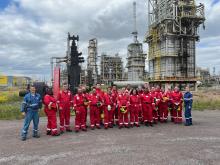The excursion to TotalEnergies Raffinerie Mitteldeutschland GmbH has been an integral part of the crude oil processing course for many years. The plant in Leuna is still regarded as the most modern and energy-efficient crude oil refinery in Europe. This tour is therefore ideally suited to underpin and supplement the knowledge imparted in the lectures of the Chair of Reaction Engineering.
The 20 available places were fully booked. In the end, 19 participants traveled to Leuna on the day of the excursion (one cancellation for personal reasons). The participants can be assigned to the following areas:
- Students of various degree programs of Faculty 4 incl. students of the course "Sustainable Fuels"
- PhD students from Faculty 4
- One student from Faculty 2
- Accompanying persons from the Chair of Reaction Engineering
At 9:30 a.m. on the dot, we were welcomed by Ms. Müller (Public Relations) in front of the refinery's main building. This was followed by a short safety briefing. Mr. Kirchberg then gave us a brief overview of the refinery complex and typical areas of work for a process engineer in the company. Of particular interest was the presentation of current projects to improve efficiency and save energy (integration of low-temperature heat into the Leipzig district heating network, connection of the refinery to electrolysis hydrogen production in Bad Lauchstädt). In addition, current cases of damage were shown and their solutions discussed.
After donning personal protective equipment, the central process plants of the refinery were inspected in three groups (crude oil distillation, gasoline hydrogenation/catalytic reformer, FCC plant). The most important components of each plant were presented, reactants and products were tapped at the relevant sampling points and a large number of questions were answered.
Strengthened and refreshed, we left the canteen for an approximately one-hour tour of the refinery, during which Mr. Böhm explained the functions of the most important process plants and ancillary facilities such as the refinery power plant, waste water treatment and product pipelines in a very vivid way. We were then transferred to the POX methanol plant. In the control room building, in addition to a direct view of the control room itself, we had the opportunity to marvel at the detailed and room-filling model of the methanol plant and to obtain some information on its history and future development. This was followed by a tour of the plant, which differs greatly from the refinery plants already presented (gasification and synthesis plant) due to its age and the reactions taking place. This rounded off the content of other lectures, such as industrial chemistry and special reaction technology.
In the final feedback round, a number of participants took the opportunity to ask questions and make comments. Overall, both the organization and the content of the event were highly praised. At around 5:15 p.m., after a long and intensive day, we set off on our return journey towards Freiberg.
